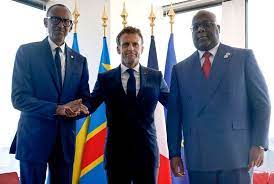Rwandan President Paul Kagame and his DR Congo counterpart Félix Tshisekedi have met on the sidelines of the United Nations General Assembly at the behest of France in a new rapprochement to build trust and confidence as neighbors.
DR Congo under Tshisekedi has not hidden its distrust of Rwanda, whom it accused of backing M23 rebels to wreak havoc in the already beleaguered country still reeling from a chronic security crisis.
Observers of the Kagame-Tshisekedi meet in New York hosted by French President Emmanuel Macron have been quick to conclude that normalizing diplomatic relations between Kigali and Kinshasa will address the root causes of instability in the eastern end of Africa’s second largest country located in the Great Lakes region where insecurity is endemic and affects over three million people.
The humanitarian implications of the conflict in DR Congo traverse at least four Great Lakes countries.
This new rapprochement is the latest after the two leaders reached an accommodation in Luanda, Angola in June this year under the mediation of Angolan President João Lourenço.
But many believe there is still a long hurdle to overcome the mutual distrust and built trust and confidence between two neighbours who continue to accuse each other of supporting rebels hostile to their respective governments.
Kinshasa does not trust Rwanda’s relations with the M23 rebels, who have been involved in a series of clashes with the Congolese army since the end of May.
The Congolese leader used the platform of the UN General Assembly to renew this accusation of Kigali, coming just months after their rapprochement in Luanda was supposed to lead to a deal for the building blocks to peace and stability in the Great Lakes region.
The fact that most M23 fighters speak Kinyarwanda has not helped allay Tshisekedi’s fears but President Kagame had responded on the same platform, prompting President Macron to intervene and bring the two leaders together in a meeting which he hopes would facilitate a shift in each other’s position from accusing each other to helping resolve one of Africa’s most protracted security quagmires of the past 20 years.
Kigali had always denied Kinshasa’s claims and in turn accused DRC of backing FDLR rebels fighting to overthrow Kagame’s government.
Kagame told the UN General Assembly in New York that recent setbacks to bring peace to the Great Lakes Region have served to highlight that the security situation is fundamentally fragile and no different from what it was 20 years ago, when the largest and most expensive United Nations peacekeeping mission was first deployed to DR Congo.
Kagame believes that a departure from the back-and-forth blame game between his country and DR Congo would help the protagonists address the root causes of instability.
However, some analysts believe that for peace to reign in eastern DR Congo, the United Nations should review its policy of intervention and address some of the problems that led to violent protest against its peacekeeping mission in the country in July.
The M23 are named after a peace agreement in March 23, 2009, between leaders of the former rebel group, the National Congress for the Defense of the People (CNDCP), and the Congolese government.
It is a breakaway faction of the CNDCP with its members mostly from the Congolese Kinyarwanda speaking community.
In October 2013, thousands of M23 combatants fled mainly to Uganda and another small group to Rwanda as Congolese troops backed by a special regional intervention brigade under UN mandate captured their strongholds in North Kivu Province.
The then overpowered M23 rebels which reportedly scattered into the bushes, with some sneaking into Uganda as refugees.
After being defeated militarily, the M23 held talks with the government during round of talks which were heals in Nairobi, Kenya before the two parties signed an accord that included provisions allowing former rebels to return as a step towards reintegration into civilian life.
More recently in April this year, rebel group re-emerged by taking control major parts of North Kivu province in Eastern DR Congo including the Bunagana border post, one of the official entry points linking Uganda and DR Congo.
The total strength of UN peacekeeping troops in DRC is approximately 18,300, according to the latest official figure by the UN.
CU/as/APA


